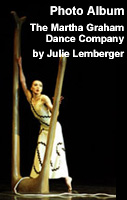|
|
the
New York manufacturer of fine dance apparel for women and girls. Click
here to see a sample of our products and a list of web sites for purchasing.
With Body Wrappers it's always performance
at its best.
|
Go
back to Flash Reviews
Go
Home
Flash Review, 11-29: Miraculous
Learning to Swim with Grace Ellen Barkey
By Paul Ben-Itzak
Copyright 2001 The Dance Insider
PARIS -- In 1984, paying my journalistic
dues in New Jersey, I was dispatched to a high school graduation in Montgomery
Township. At the conclusion, the seniors tossed Tom Cruise a la Risky Business
ray-bans into the air. But what I remember most is the exhortation of the commencement
speaker, a woman who had risen to CEO of a major corporation. The secret to her
success, she said, was something her father had taught her: Even when life deals
you what seems a severe blow, there may be an opportunity lurking there. Somewhere
along the line, Brussels-based choreographer Grace Ellen Barkey seems to have
learned a similar lesson.
When the estate of Bela Bartok, on
seeing the premiere of Barkey's version of Bartok's "Miraculous
Mandarin" at PS 122 in 1999, withdrew the rights, Barkey seems to have asked
herself, "What's the opportunity here?" The answer is "Few Things," a version
of the same work sans the Bartok music and with a much more wholly mod score,
which had its Paris premiere last night at the Theatre de la Bastille, with Barkey
dancing one of the lead roles, for the first time. Having seen the original, I
can only exclaim that, if anything, Barkey (and company) has expanded her original
vision. From a work that demonstrated what truly avant modern art is all about,
Barkey has moved to a work that exemplifies the cathartic power of art.
Coincidentally, on this very day,
yesterday, I found myself once again putting that ancient speaker's exhortation
to the test. In the midst of a particularly icky situation, I expostulated, "Now,
what the fuck can possibly be the opportunity in THIS one?" The answer isn't relevant
to this discussion, but the antidote certainly is, because it was provided by
Barkey and her fellow needcompany performers. At its best, what art can do is,
when you've just been circulating the same angst-filled words around and around
in your head, calculating all the worse-case scenarios, and wondering which goblin
might be outside your door when you open it, art, and particularly dance, can
wrench you and make you wretch it all out in one cathartic contraction.
"Let it Bleed," I wrote in my notebook
finally. It may have been when the Tourette's-like Misha Downey and powder-keg
Kosi Hidama, torsos bared above grotesque courtesan dresses, were flipping each
other around, in a duet that was both brawny and delicate; it may have been when
Tijen Lawton, in a poignant, achingly extended solo, was contorting around on
the ground, her back, bare under a mandarin orange Chinese tunic, arching and
twisting and sending spasms spiraling through to her bent head. Or perhaps I wrote
that while watching Simon Versnel -- the original mandarin, now referred to as
Mr. Poodle or, in French, Monsieur Caniche -- whimpering, first to Barkey's courtesan,
whose teasing he is at the mercy of, then, abandoned, to those strange people
out in the audience. But, notwithstanding the removal of blood as the most significant
change in this version, it felt like a wound had been opened, and the poisoning
puss was flowing out.
I think many of us want to whimper
sometimes, words being ultimately futile in, if not explaining our sadness or
tragedy, expurgating the negativity. We do this inchoately when we cry. In Barkey's
hands, and the bodies of her performers, those tears become lasers; more than
a generalized release or reaction, the feelings expressed by her dancers, through
the motions she gives them -- the allegro and the adagio -- work their ways into
our hearts, into all the canals where the poison may lay stagnant.
Alors, the performers reading this
may be scratching their heads and saying, "Gee, lighten up! It's a comedy!" And
there's certainly that at play, from the get, when actor after actor -- beckoned
on, usually by Downey, enters the stage stark or near stark naked, asking for
their underwear. Downey seems to be hoarding enough to cover everyone, as he obliges
one and then the other by pullingthe garment from under his kimono, two walnuts
falling out the last time he does this. It's there of course in Versnel's poodle-mandarin
too, for instance as he struggles vainly to remove the squirming on the ground
lithesome Barkey's emerald green robe and panties with his teeth. It's there,
a shiny giggle, in the light clear plastic suit in which Versnel emerges before
for a rendezvous with the courtesan. And Barkey the performer seems to be nudging
us in that direction with the amused, glinty-eyed half-smile with which she regards
much of the action, arms folded as she scopes it out, as if to say, What next?
And certainly, the normally subdued Parisian audience -- I've gotten scowls for
laughing at the theater here -- reacted with uncommon ribaldry last night in a
regular battery of titters if not outright guffaws.
But I think what Barkey has created
is a "comedy" in the old French sense of the word: "Few Things" is a dance play
that, as brilliantly vast in its landscape as is the color range of the oversized
Chinese-style lanterns which ring the stage, communicates that the whimpering
and the cardboard penises, the close-yet-so-far biting at underwear, the Tourette's
syndrome guy who you can't avert your eyes from even as he's screaming in your
face FUCK YOU!, the middle-aged man with the atypical dancer's body flexing his
arms, doing jumping jacks and faux karate hi-yas, and flouncing his naked tummy
with the same brio that more toned dancers might flex their washboard versions,
the cool sleek woman in the lime-green kimono -- it's all part of a day in the
life, the "Few Things" that -- the good and the bad -- make a life for us.
All the above I wrote last night.
Dreamland brought more insight: In mine -- as perhaps in yours -- the "basement"
of my mother's house has always been a cavernous, dank, dark, scary place, with
goblins lurking, which I've dreaded to enter. (As dream images go, this one is
fairly obvious -- the basement being the place where the family secrets are kept,
the things you know in the back of your mind are there, but are afraid to research
for. In other words, you don't wanna go there.)
So this dream involved a delegation
-- perhaps from some organization combining the best parts of the United Nations
and the circus -- staying at my mom's old house in Noe Valley, San Francisco.
In the morning, someone revealed to me, hidden on the back of the elephant, five
tiger cubs, in a blanket. I wanted to pet them, they were so cute, but they were
also tigers. For some reason it was a secret that they were there. The elephant
kept straying down 25th Street; I remember wanting to remind the man or woman,
Hey, um, your elephant is wandering away.... He told me that he had found a perfect
place in the house in which to house the tigers: It was a room, real but which
I'd forgotten about, in the basement, which we'd made (in real life) into my room
my last years living at my mom's house. It had a thick plush 70s-style orange
carpet. (Why is the radio playing only the thumpy part of Rite of Spring now???)
It was very light. And wood. I had parties there and my stereo and my first kiss.
We could look down on it from a hole in the floor between the kitchen and dining
room. It was very light.
In this morning, too, as Paris is
coming to life, and I no longer feel icky, though it is dewy dampy outside, from
Grace Ellen Barkey's new non-"Miraculous Mandarin" but ever more miraculous dance,
two moments and one bit of dialogue stand in relief, like the strongest images
of a dream which remain, unforgettable, imprinted in your heart, when you wake
up.
In general, a conversation with a
dancer confirmed afterwards, while the music has changed, and the meaning expanded,
much of the original action of Barkey's take on Bartok's "Miraculous Mandarin"
is retained. The beginning, however, seems new. Before the distribution of underwear,
costume and set designer Lot Lemm steps onto the stage and plays some slides.
These are of water, a sea, and a man in the sea. On a pastel blue that could be
straight from "Swimmy," suddenly the outline of a man, enlarged from a cut-out,
is seen swimming inside the waves. Then Tijen Lawton is summoned on stage, appearing
in full bathing suit and goggles regalia, mounting a table and mugging as she
flaps her arms.
Later in this dance-theater creation,
Barkey's courtesan is lead about the stage by Versnel (upright, not on all fours),
this way: He cradles (or is it clutches intractably?) her head in his palms, walking
backwards, as she, leaning back so that her body is almost parallel to the ground,
propels herself backwards, only with her feet, he taking the rest of her weight
through her head. Her hands protectively squish her kimono bunched in her chest,
clutching and unclutching. Then slowly one hand lets go, and in that hand, we
see all the tension, as it almost undetectably clutches and releases. We see it
too in a moment downstage center, when she tilts her head sideways, it still in
his palms, and looks straight out at us. It is a fearful look, but yet, in this
canvas of life's extremes -- from the fuck yous to the fucking, it's contradictions
hinted at by e.e. cummings poems that salute the beauty in its krassness, and
a tale of another mandarin who, told by a courtesan he had to visit 100 nights
before he could sleep with her, and on the 100th night, didn't return (but this
is not a mandarin, this is a poodle, a narrator reminds us) -- this canvas, Grace
Ellen Barkey's world, ultimately invites us to let go and fall, into the water,
to swim and even let ourselves be buffeted about by its currents. After all, as
we're told, death is just a guy in a cafe having a coffee and laughing at the
life he sees going on about him, an amused glint in his eye.
Go
back to Flash Reviews
Go Home
|








